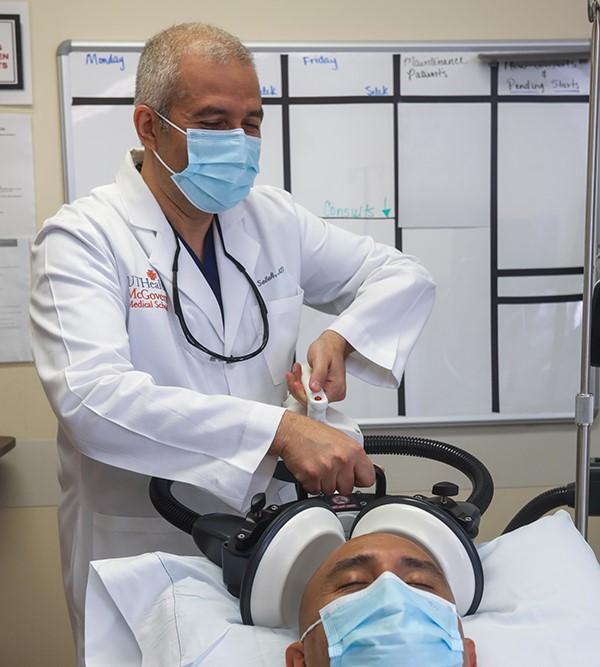
Credit: Maricruz Kwon/UTHealth
Researchers are assessing whether magnetic seizure therapy (MST) can help relieve treatment-resistant depression in bipolar patients in a clinical trial led by The University of Texas Health Science Center at Houston (UTHealth).
The trial, which takes place at UTHealth Harris County Psychiatric Center (UTHealth HCPC), will study whether the novel treatment can deliver the same results as the standard of care, electroconvulsive therapy (ECT), without the potential cognitive side effects.
During ECT, small electric currents are passed through the brain, intentionally triggering a brief seizure. The seizures cause changes in brain chemistry that can reverse symptoms of certain mental health conditions.
“ECT is still considered the gold standard for treatment-resistant depression, but it can have negative side effects in some patients, including memory problems,” said Salih Selek, MD, professor in the Louis A. Faillace, MD, Department of Psychiatry and Behavioral Sciences at McGovern Medical School at UTHealth and director of the UTHealth Refractory Mood Disorders Program at UTHealth HCPC. “In this trial, we’ll use a different machine that uses magnetic waves, not electricity, to induce seizures. So instead of sending an electric signal to the brain, it sends magnetic waves to the frontal parietal lobe of the brain, which helps control emotions.” Selek is also a psychiatrist with UT Physicians, the clinical practice of McGovern Medical School.
The magnetic pulses can focus the stimulation to a specific area of brain tissue, since they do not have to go through the scalp and skull to reach the brain as in ECT.
Bipolar disorder is a neurobiological brain disorder that affects approximately 2.3 million Americans today. Many patients with bipolar disorder either don’t respond at all or don’t respond well to antidepressant medication, Selek said.
“Depressive episodes are common during the course of the bipolar disorder, and now the pandemic is causing increased stress and depression for many,” Selek said. “Sometimes depression in bipolar patients can lead to suicide attempts, so it is critically important for us to know the best way to treat bipolar depression in patients who’ve already tried all other treatments.”
“We are very excited that UTHealth will start to test the potential role of this new technology as a treatment for severe, treatment-resistant bipolar depression,” said Jair Soares, MD, PhD, the Pat R. Rutherford, Jr. Chair in Psychiatry in the Faillace Department of Psychiatry and Behavioral Sciences. “Bipolar depression is an important area where new treatments are really needed. It’s good timing for a study like this, given the current stressors caused by COVID-19.” Soares is also the executive director of UTHealth HCPC.
###
Researchers are looking for 60 participants who will be randomized to ETC or MST. Patients must be over 22 years of age. Both arms of the treatment are done under anesthesia and will be completed in up to 15 sessions over five weeks.
For more information, visit ClinicalTrials.gov or contact 713-741-5915.
Media inquiries: 713-500-3030
Media Contact
Amy Laukka
[email protected]
Original Source
https:/




